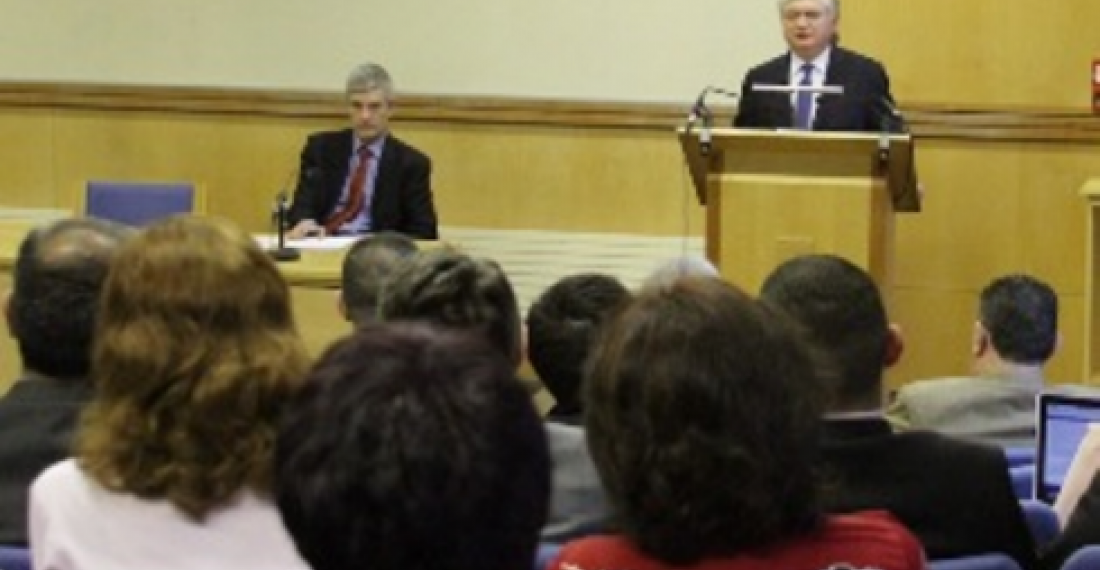Armenian Foreign Minister Edward Nalbandian on Tuesday gave a wide ranging lecture on Armenian Foreign Policy to members of Oxford University at St Antony's College.
According to the website of the Armenian Foreign Ministry
"In his presentation and his answers to the questions that were posed, Armenia's Foreign Minister spoke about Armenian-British relations, the objectives and results of his current visit to UK, the priorities of Armenia's chairmanship in the Council of Europe, the ongoing integration processes in the post-Soviet expanse, the Armenia-European Union cooperation, and Armenia's outlook on several regional and international matters."
Commonspace.eu political editor contributed this commentary on the current state of Armenia's Foreign policy:
"Edward Nalbandian has been Foreign Minister of Armenia for five years - a time during which the country faced some tough challenges in the foreign policy arena. Nalbandian is a career diplomat who was catapulted to the head of his country's diplomacy after President Serzh Sargsyan became President in April 2008. He replaced an experienced and well liked predecessor, Vartan Oscanian, who had been in office for a long time, and had left his mark on Armenian diplomacy.
Nalbandian over the years grew out of Oscanian's shadow and developed his own style. Many observers feel that he has grown in the job, and his performances on the international stage these days are much more polished and relaxed than in earlier occasions when he came across as terse and somewhat crude.
This is not however due to the fact that the challenges facing Armenian Foreign policy are any easier. A small country, with limited resources, Armenia has to engage in global diplomacy as if it was a superpower. Locked in its bitter conflict with Azerbaijan, and in a historical confrontation with Turkey, it has been obliged to punch well above its weight. Its only assets are the large and influential Armenian communities spread throughout the world, who often come to the rescue of Armenian diplomacy. But they come with too with their own baggage and agendas, and support is by no means a one way traffic. Armenian diplomats nowadays continue to heroically staff the only foreign diplomatic mission still left in the Syrian city of Aleppo, in an effort to safeguard the interests of the long established Armenian community in Syria.
Perhaps the biggest challenge to Armenian foreign policy is managing its relations with Russia. Armenia'dependence on Russia in the military, financial and economic spheres is a source of concern in Armenia and beyond. Yet Armenia's choice in this matter is limited. Armenia feels it needs to balance its enemy - Azerbaijan with whom it is still technically in a state of war, and adversary - Turkey, with whom it has no diplomatic relations.
Armenia's efforts to upgrade its relations with the European Union took some by surprise, however this now gives Armenia some, even if not a lot, of leeway. Armenia will soon sign an Association Agreement with the EU. Armenia also has to manage relations with Georgia regardless of its relations with Russia, and with Iran regardless of its relations with the US.
Armenian diplomacy under Nalbandian has in all this been remarkably flexible and adaptive, even if it often looked as if Armenian diplomats were walking on glass: Reaching out to Turkey in 2009 but wriggling out of the disappointment when the Turks backtracked; going for a Deep and Comprehensive Free Trade Agreement with the EU, despite Russia's attempts to get Armenia within the Eurasian Union; being a member of the CSTO Russian led military organisation, and having an active partnership agreement with NATO.
Yet on one issue flexibility dries up completely. Armenia's position on the Karabakh conflict has hardly changed since Nalbandian has been in office. The support of Armenia for the current negotiating framework, down to the last detail, is to say the least odd. Armenia blames Azerbaijan for the failure of the Karabakh peace process. But even if that was the case flexibility in diplomacy is often better than rigidness.
Nalbandian believes that a foreign minister's first priority is loyalty to his country's interests. In Armenia these interests are defined by the President. President and Foreign Minister need to think hard what has worked and what has not in Armenian foreign policy and consider how flexibility could become a virtue in all aspects of their foreign policy."
source: commonspace.eu
photo: Armenian Foreign Minister Edward Nalbandian addressing members of Oxford University on Tuesday, 21 May 2013 (picture courtesy of the Armenian Foreign Ministry).







